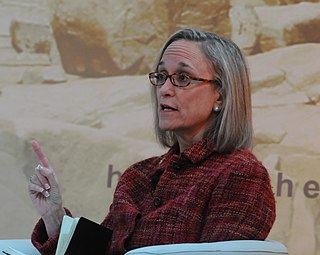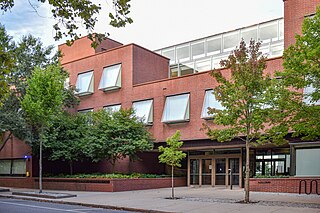
The Paul H. Nitze School of Advanced International Studies (SAIS) is a graduate school of Johns Hopkins University based in Washington, D.C. with campuses in Bologna, Italy and Nanjing, China.

Carla Anne Robbins is an American journalist, national security expert, and the former deputy editorial page editor of The New York Times. Prior to her career at The New York Times, Robbins worked for BusinessWeek, U.S. News & World Report, and The Wall Street Journal. During her thirteen-year career at The Wall Street Journal, she won multiple awards and was a member of two Pulitzer Prize-winning reporting teams. She is now a senior fellow at the Council on Foreign Relations where she co-hosts the weekly podcast The World Next Week and faculty director of the MIA program at Baruch College's Marxe School of Public and International Affairs.

The Watson Institute for International and Public Affairs is an interdisciplinary research center at Brown University in Providence, Rhode Island. Its mission is to promote a just and peaceful world through research, teaching, and public engagement. The institute's research focuses on three main areas: development, security, and governance. Its faculty include anthropologists, economists, political scientists, sociologists, and historians, as well as journalists and other practitioners.

The School of International and Public Affairs (SIPA) is the international affairs and public policy school of Columbia University, a private Ivy League university located in Morningside Heights, Manhattan, New York City. It is consistently ranked one of the leading graduate schools for international relations in the world. SIPA offers Master of International Affairs (MIA) and Master of Public Administration (MPA) degrees in a range of fields, as well as the Executive MPA and Ph.D. program in Sustainable Development.
Robert Jeffrey Art is Christian A. Herter Professor of International Relations at Brandeis University, and Fellow at MIT Center for International Studies. He subscribes to the theory of neorealism, which argues that force still underlies the power structure in the modern world. He is a member of the Council on Foreign Relations, a United States nonprofit think tank specializing in U.S. foreign policy and international affairs.

The International Women's Media Foundation (IWMF), located in Washington, D.C., is an organization working internationally to elevate the status of women in the media. The IWMF has created programs to help women in the media develop practical solutions to the obstacles they face in their careers and lives. The IWMF's work includes a wide range of programs including international reporting fellowships in Africa and Latin America and providing grant opportunities for women journalists, research into the status of women in the media, and the Courage in Journalism, Anja Niedringhaus Courage in Photojournalism, and Lifetime Achievement Awards. The IWMF advocates for press freedom internationally and often forms petitions asking international governments to release journalists in captivity and offer protection to journalists in danger.
Jeanne Harley Guillemin was an American medical anthropologist and author, who for 25 years taught at Boston College as a professor of Sociology and for over ten years was a senior fellow in the Security Studies Program at Massachusetts Institute of Technology. She was an authority on biological weapons and published four books on the topic.

Maurice Moses "Maury" Obstfeld is a professor of economics at the University of California, Berkeley and previously Chief Economist at the International Monetary Fund. He is also a nonresident senior fellow at the Peterson Institute for International Economics.
The MIT School of Humanities, Arts, and Social Sciences (SHASS) is one of the five schools of the Massachusetts Institute of Technology, located in Cambridge, Massachusetts, US. The school includes 11 academic areas and works alongside six departments, labs, and programs. SHASS grants SB, SM, and PhD degrees. Major fields of study include anthropology, comparative media studies and writing, economics, history, linguistics, literature, music, philosophy, political science, science, technology, and society, and theater arts. Other programs include the Center for International Studies; Knight Science Journalism; Science, Technology, and Society; Security Studies; and HyperStudio.
Council for a Livable World is a Washington, D.C.-based non-profit advocacy organization dedicated to eliminating the U.S. arsenal of nuclear weapons. Its stated aim is for "progressive national security policies and helping elect congressional candidates who support them." The Council was founded in 1962 as the Council for Abolishing War by Hungarian nuclear physicist Leó Szilárd. Its education and research arm, the Center for Arms Control and Non-Proliferation, provides research to members of Congress and their staff. In February 2016, John F. Tierney was appointed the executive director of the Council for a Livable World and the Center for Arms Control and Non-Proliferation. For more than 50 years, the Council for a Livable World has been advocating for a more principled approach to U.S. national security and foreign policy.

Michael E. Brown is an American academic. He formerly served as Dean of the Elliott School of International Affairs of the George Washington University, where he currently serves as Professor of International Affairs, Political Science, and Gender Studies.
Barry Ross Posen is Ford International Professor of Political Science at MIT and the director of MIT's Security Studies Program. An expert in the field of security studies, he currently serves on the editorial boards of the journals International Security and Security Studies and is a member of the Council on Foreign Relations and served as a study group member for the Hart-Rudman Commission. Posen is a structural realist.
The Fletcher School of Law and Diplomacy is the graduate school of international affairs of Tufts University, in Medford, Massachusetts. Fletcher is one of America's oldest graduate schools of international relations and is well-ranked in its masters and doctoral programs. As of 2017, the student body numbered around 230, of whom 36 percent were international students from 70 countries, and around a quarter were U.S. minorities. The school's alumni network numbers over 9,500 in 160 countries, and includes foreign heads of state, ambassadors, diplomats, foreign ministers, high-ranking military officers, heads of nonprofit organizations, and corporate executives. It is consistently ranked as one of the world's top graduate schools for international relations.
John Tirman was an American political theorist. From 2004, Tirman was executive director and principal research scientist at the MIT Center for International Studies. There he led the Persian Gulf Initiative, which conducted work on Iraq war mortality and U.S. and Iran relations, as well as other projects. He was the author or coauthor of 13 books on international affairs, many of them exploring and advocating the “human security” paradigm in global affairs, and was a frequent contributor to AlterNet, The Huffington Post, and The Boston Globe.
Middle Eastern Americans are Americans of Middle Eastern background. This includes people whose background is from the various Middle Eastern and West Asian ethnic groups, such as the Kurds and Assyrians, as well as immigrants from modern-day countries of the Arab world, Iran, Israel, Turkey, and Armenia.

Abbas Maleki is an Iranian associate professor of energy policy in the Department of Energy Engineering and in the research institute for science, technology and industry policy at Sharif University of Technology in Tehran. He was the former Senior Associate at Belfer Center for Science and International Affairs, Harvard Kennedy School of Government in 2007-2017. He was a member of the Network of Global Agenda Councils of World Economic Forum (Davos) for 2011-12, while he was the Robert E. Wilhelm Fellow at Centre for International Studies, MIT at the same time. He editted his book "US-Iran Misperception: A Dialogue" with John Tirman during this period of time. In his political background, he had been the Deputy Foreign Minister of Iran from 1980 to 1997, and one of the members of the negotiating team for ending the Iran-Iraq War from 1987 to 1992. His educational background is a Ph.D. in Strategic Management from the High University of Strategic Sciences. He has graduated MSc in Industrial Engineering and Management, and a BSc in Mechanical Engineering, both from the Sharif University of Technology. He has several publications on energy policy, energy security, public policy, foreign policy of Iran, the Islamic Revolution of Iran, Central Asia, Transcaucasia, and Caspian Studies.
Jackee Budesta Batanda is a Ugandan journalist, writer and entrepreneur. She is a senior managing partner with Success Spark Brand Limited, a communications and educational company, and a co-founder of Mastermind Africa Group Limited, a business-networking group. In 2006, Batanda worked as a peace writer at the Joan B. Kroc Institute for Peace and Justice at the University of San Diego. She was later awarded a research fellowship at the highly competitive Justice in Africa fellowship Programme with the Institute for Justice and Reconciliation in Cape Town, South Africa, in 2008. In 2010, Batanda was International Writer-in-Residence at the Housing Authors and Literature Denmark, where she commenced work on her novel, A Lesson in Forgetting. In 2012, she was also featured in The Times alongside 19 young women shaping the future of Africa. That same year she was also a finalist in the 2012 Trust Women journalism Awards. She has been writer-in-residence at Lancaster University in the UK. She was selected by the International Women's Media Foundation as the 2011–12 Elizabeth Neuffer Fellow. During the fellowship, she studied at the Massachusetts Institute of Technology's Center for International Studies and other Boston-area universities, and worked at The New York Times and The Boston Globe.
The Center for Comparative and International Studies (CIS) is a political science research institute founded in 1997 and based in Zürich. It is joint initiative between the institute of political science of the University of Zurich and the political science chairs of the Swiss Federal Institute of Technology. The director of the institute is Frank Schimmelfennig, Professor of European Politics. The staff is 170.
Maris Taylor Fravel is an American scholar and author. He specializes in the areas of international relations, international security and territorial disputes.








